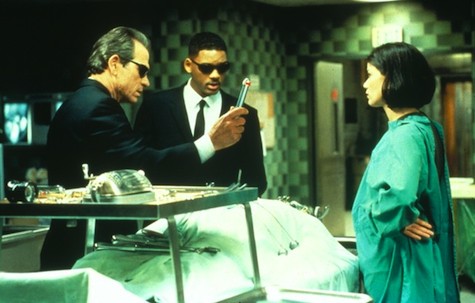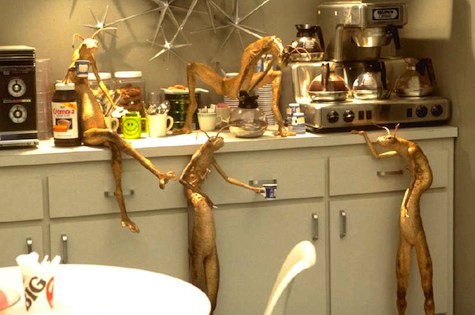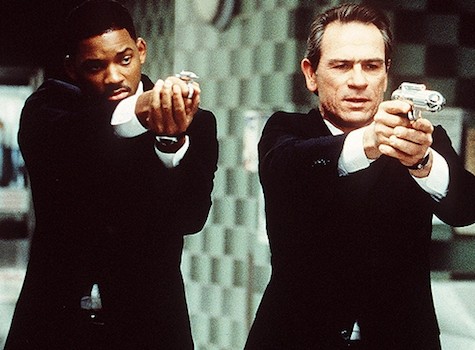It’s all too easy to forget how funny science fiction can be when given the chance.
That’s partly because science fiction is often used to convey deep and thoughtful analysis on humanity and the world we occupy, but additionally there is simply less outright science fiction comedy. Perhaps it’s also because sci-fi comedy can easily descend into pure parody and cease to be funny at all. The second Men in Black film made that vital error, and we’re all understandably nervous about part III. But while it’s not the greatest science fiction comedy film ever created (that award goes to Galaxy Quest, hands down) when Men in Black was first released, it was the only game in town. And people loved it.
I was in sixth grade the year that Men in Black was released and I think it’s important to note that, to kids and preteens, this film was like pixie stix and Air Jordans and original Nick Toons combined. It had everything: aliens, big silver guns, slime, cockroaches, weird future tech, a Danny Elfman soundtrack, and Will Smith.
Yes, I said Will Smith.
Smith was riding high on that Fresh Prince of Bel-Air wave, and Independence Day had already set him up as the man you wanted defending the Earth from alien threats. (It was that punch-in-the-face “Welcome to Earth” moment. So many kids mimicked that in hallways on their way to class.) He hadn’t been on the scene long enough for the world to get tired of his Peter-Pan-gone-hip attitude; if anything, Will Smith was the epitome of cool to the little ones. And casting him alongside the ever-sardonic Tommy Lee Jones was a recipe for the ultimate odd couple in the buddy cop line of succession.

The movie was full of exciting visual gags and ridiculous voices; Frank the talking dog, chain-smoking alien administrative assistants, hamster-sized guns that could blow holes in the side of a building. It had humor for kids and adults due to the age difference between its main characters, and a villain that was genuinely scary, who looked genuinely alien. I recall seeing an interview with Vincent D’Onofrio where he claimed that the makeup and prosthetics for Edgar had been somewhat painful to apply and wear all day, and I feel like it comes across in his performance and intensely awkward body language. And it wasn’t all about the boys—Linda Fiorentino’s Laurel was a star addition to the cast, tough and incredulous and a welcome dose of common sense to the insanity going on.
It took elements of all your favorite sci-fi tropes, stuck them in a blender, and kept the lid off so everything hit the wall once you pressed “liquify.” What made Men in Black special was that no one had bothered to do anything quite like that on screen before. A maybe because it was so brazen about it, it worked. Little galactic royals in human robot suits, 36 hour days, government conspiracy, cars that could drive on ceilings, all your favorite celebrities turning out to be aliens, tabloids that reported the truth, instruments that allowed you to erase someone’s memory and replace it with a shiny new one.
And then there was the theme song.
I’m not saying that I am an avid follower of Will Smith’s musical career, but I cannot impress upon the world how important this song was when the film came out. Everyone sang it. Knowing all the lyrics was a badge of honor. When I did my sixth grade play, there was a dance break in the middle of it (to accommodate kids who were better at dancing than acting, I guess), and this was the song they danced to. Nevermind the fact that it had nothing to do with the fairly serious subject matter of the play we were performing. In fact, the play was called The Girl Who Was Asked to Turn Blue, and everyone in the play was in blue makeup and clothes. Not black. The irony was superb.

Men in Black was also a big hit in my book because it made a lot of things that the general population considered to be unbearably geeky suddenly socially acceptable. Liking aliens ceased to be quite so strange after this movie made everyone laugh. And for all that it was thin as tissue paper in the depth department, there were solid emotional moments in there. Jay sits on a bench all night deciding whether or not to give up everything that makes him an individual to find out the truth about what he saw. Watching Agent Kay delete the woman he loved from a satellite search to prevent Jay from knowing about his past hurt. The decision to go back to his old life at the end was beautifully bittersweet for such a silly movie.
And the film seemed to know just what note to end on; that alien hand picking up our galaxy in a marble and tossing it into a bag full of them might have been a jibe at how small humanity is in the grand scheme of things… or it might have simply been a shorthand way of saying “you know what? Don’t take things so seriously. Let go and have fun.”

Which is exactly what the movie was about.
It can’t be denied, the sequel fell on its face. It came down to one unforgivable offense in my mind; to bring back Kay, Laurel was ignored and written out of the script entirely. I’m sorry, but Agent El deserved a place in that film even if she wasn’t Jay’s partner anymore. Her absence opened the door for more of the same old: even cheaper camp, repeated jokes, and bad imitations of other franchises. It seemed to indicate right from the beginning that they had forgotten how to have fun with their ridiculous premise. And forgetting that was never going to give them a workable addition to the MiB universe.
All the same, I hope that the third film manages to recapture some of that fun. More whimsy and fewer explosions. More dialogue, fewer catchphrases. Sheer weirdness over carefully conceived kitsch. That’s what I loved as a kid. I’d like it back. (And Danny Bowes’ spoiler-free review brings me hope.)
In the meantime, I’ll be walking my talking pug.
Emmet Asher-Perrin reminds you that if you’re going to replace people’s memories, you should make them happy memories. You can bug her on Twitter and read more of her work here and elsewhere.










